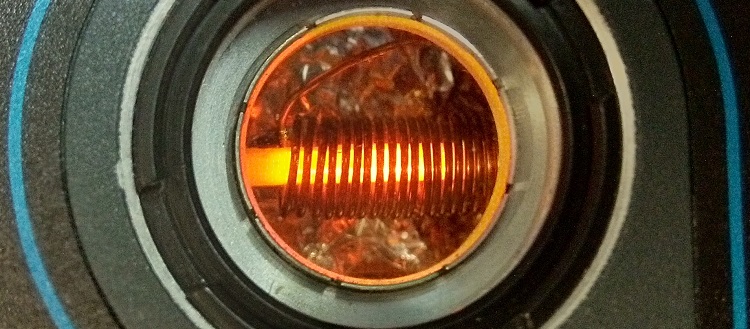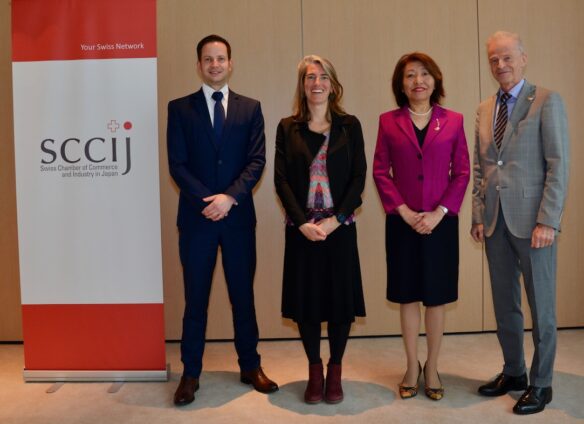Tokyo (SCCIJ) – Scientists and entrepreneurs in Switzerland are driving quantum computing research to the next level. They set a world record for the storage of quantum bits (qubits), the smallest units of information in a quantum computer. Another discovery will help to increase the number of available qubits. And a startup that aims for transistors the size of human DNA has raised 75 million dollars.

Photonic qubits are stored in a crystal illuminated by a laser (© Antonio Ortu/UNIGE).
New World Record
A team of researchers led by University of Geneva senior lecturer Afzelius Mikael has succeeded in storing a quantum bit for 20 milliseconds. This duration has never before been achieved by a solid-state quantum memory. The scientists used crystals doped with the rare earths metal europium, capable of absorbing light and then re-emitting it. These crystals were kept at absolute zero temperature to avoid the thermal agitation which destroys the entanglement of the atoms.
The research takes a major step towards the development of long-distance ultra-secure quantum telecommunications networks. So far, after a few hundred kilometers within an optical fiber, the photons that carry the qubits or ‘quantum bits’ (the information) disappear. They, therefore, need ‘repeaters’, a kind of ‘relay’, which are partly based on a quantum memory. “The challenge now is to extend the storage time beyond 100 milliseconds,” says Mikael Afzelius.
Increased scalability
A research group at the University of Basel, working with the IBM Research Laboratory in Rüschlikon, has chosen a different path to the computing of the future. It has come up with silicon-based qubits that are very similar in design to classic silicon transistors. The breakthrough of the group led by Andreas Kuhlmann and Professor Dominik Zumbühl tackles one of the biggest challenges in quantum computing – to combine larger quantities of qubits.
In classic computers, the solution to this scalability problem lay in silicon chips, which today include billions of “fin field-effect transistors” (FinFETs). The qubits developed by Kuhlmann’s team are based on this FinFET architecture and use holes as spin qubits. In contrast to electron spin, hole spin in silicon nanostructures can be directly manipulated with fast electrical signals. Also, their system works at slightly higher temperatures and allows the integration of control electronics.
Startup raises 75 million dollars
Also, there are Swiss startups in the quantum computing field: Terra Quantum has extended a founding round to a total of 75 million dollars by bringing on new investors with deep roots in financial services. The young company based in Rorschach in the canton of St. Gallen will use the fresh capital to strengthen its offering around data cryptography and cybersecurity.
Terra Quantum has devised the specific design for one of the most widely used electronic devices, the field-effect transistor, exploiting this phenomenon, known as “negative capacitance.” Its research opens up the realization of future super-low-power transistors the size of human DNA for the first time. It also leads to the long-sought-after terahertz frequency-based electronics. Concerning health and safety, advanced terahertz spectroscopy enabled by Terra Quantum’s ferroelectric devices will offer unprecedented diagnostic tools, like non-invasive techniques for the early detection of cancer, ex-vivo spectroscopy, and imaging of tissues (biopsy).
Text: SCCIJ with material of UNIGE, UNIBAS, and Terra Quantum





























